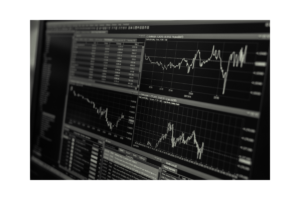CFD is defined as a contract for difference. It is a contractual agreement between a CFD broker and an investor that mandates the broker to pay the difference in the value of an asset from the point of contract opening and its current market price.
CFDs allow investors and dealers to earn from price movements without acquiring the underlying assets. A CFD contract value does not assume the value of the underlying asset, only the price difference between the trade at the opening and closing of the contract.
How does it work?
Spread
There are only two price quotes in CFD;-the buy price and sell price. The sell(bid) price is always lower than the current market value, while the buy(offer) price is slightly higher.
The difference between the ask and offer price quoted for an asset is what is known as the spread.
Usually, the cost of opening a CFD position is factored in the spread, meaning that both prices will be modified to indicate the cost of making the trade.
Deal size
CFDs trade-in standardized contracts(lots). And the underlying assets traded determines the size of an individual’s contract. The contract size should mimic the value of the assets dealing on the market.
Usually, the contract size is representative of one share in the company you are dealing with. For instance, if you want to open a position that mimics buying 1000 shares of HSBC, you will have to buy 1000 HSBC CFD contracts.
Duration
When you compare options, most CFD traders don’t have an expiry date. Instead, the dealer will close a position by placing a trade in the opposite direction to the opening trade.
For instance, a buy position of 1000 gold contracts would be closed by selling 1000gold contracts.
However, there is an overnight funding charge should you keep a daily CFD position open past the daily deadline. Although, the cut-off time varies for international markets.
Profit and Loss
When calculating profit or loss from a CFD trade, you should get the difference in value between the price at the opening and closing of the contract and multiple by the CFD unit.
And then, use the figure to multiply by the total number of contracts by the value of each contract.
However, to get a correct approximation of the loss or profit, ensure that you deduct any penalties or fees you pay. This payment includes commissions, guarantee stop fees, or overnight funding charges.
For instance; If you buy 50 FTSE 100 contracts.
If the buying price is 7500.0 and you buy 50 FTSE 100 contracts. One FTSE 100 contract is equivalent to $10 per point, meaning that with each point of upwards movement, you make $500, and for each point of downward movement, you lose $500. It’s multiplying the number of contracts (50) by the value per point ($10)

Advantages of CFDs
Higher Leverage
Compared to traditional trading, CFDs give higher leverage. However, the standard leverage in the CFD market is regulated. The CFD lower margins requirements mean greater potential returns for the trader. However, traders should bear in mind that high leverages can also mean higher losses.
Range of trading opportunity
Most brokers currently offer treasury, stock, currency, sector, and commodity CFDs. The wide range of markets enables investors interested in diverse financial instruments to trade CFDs as an option to the traditional exchange.
Go long and short
Some markets have rules that deter shorting. This rule requires the trader to borrow the instrument before selling it short. However, since CFD traders don’t own any underlying assets, they can go both long and short on instruments at any time without borrowing and worrying about extra costs.
Disadvantages of CFDs
Spread Payment
Although CFD traders are not subjected to many of the costs of traditional trading, they are obliged to pay for the expenses of spreads. Since CFD dealers have to pay for the spread on the entry and exit positions, making small profits becomes unlikely. Therefore, to calculate profits and losses resulting from CFD trading, one must factor in the spread cost.
Risks
CFDs are not risk-free. And as such, traders should have a risk management strategy since trading CFD instruments can be risky and fast-paced. A stop-loss order may not eliminate all the risks, but it can help minimize potential loss.
Weak industry regulations
CFD trading is not a highly regulated industry. As a result, the credibility of a CFD broker is based on his longevity, reputation, and financial position rather than liquidity or government standing. Therefore, to get an excellent CFD broker, be sure to run a background check on the potential candidate before opening an account.
Conclusion
Contract for difference offers a wide range of markets, which is the main reason investors choose CFDs. Moreover, CFD traders can avoid many of the costs associated with traditional trading since they don’t own the underlying assets. However, choosing a regulated, reputable, secure, and experienced CFD broker is essential to get the most out of this contract.












